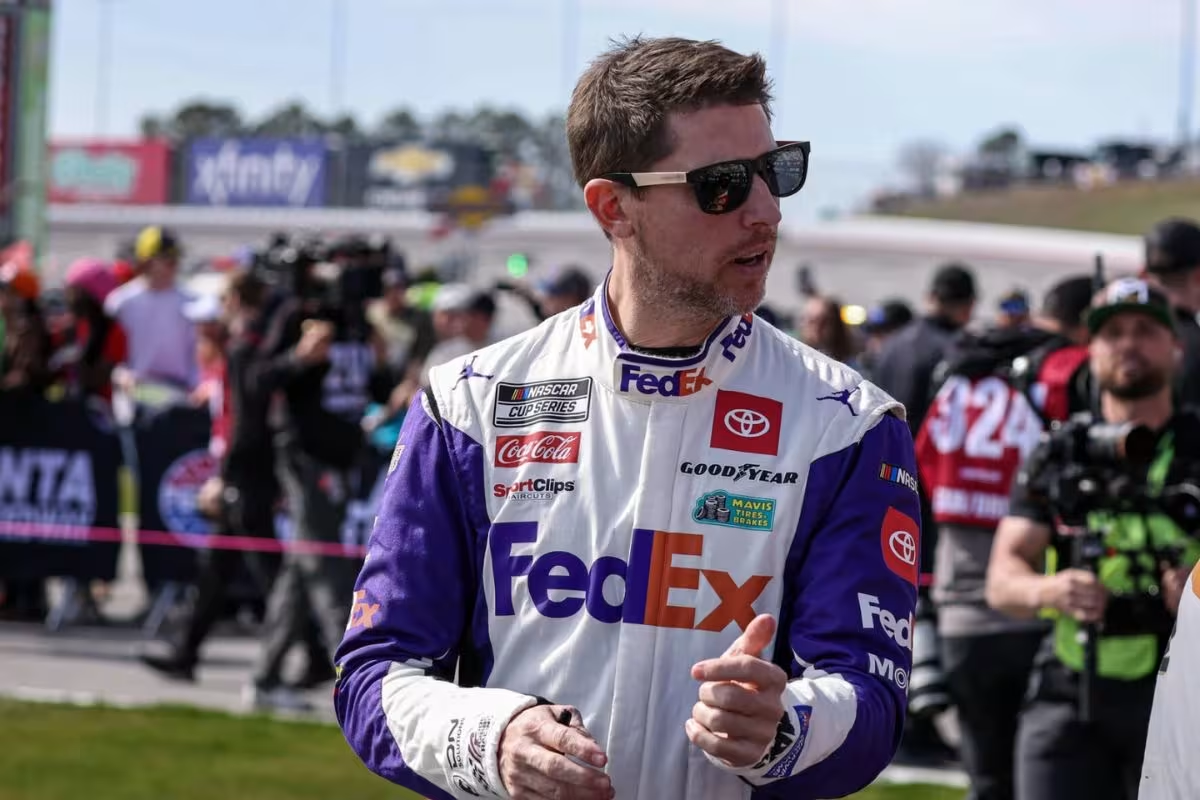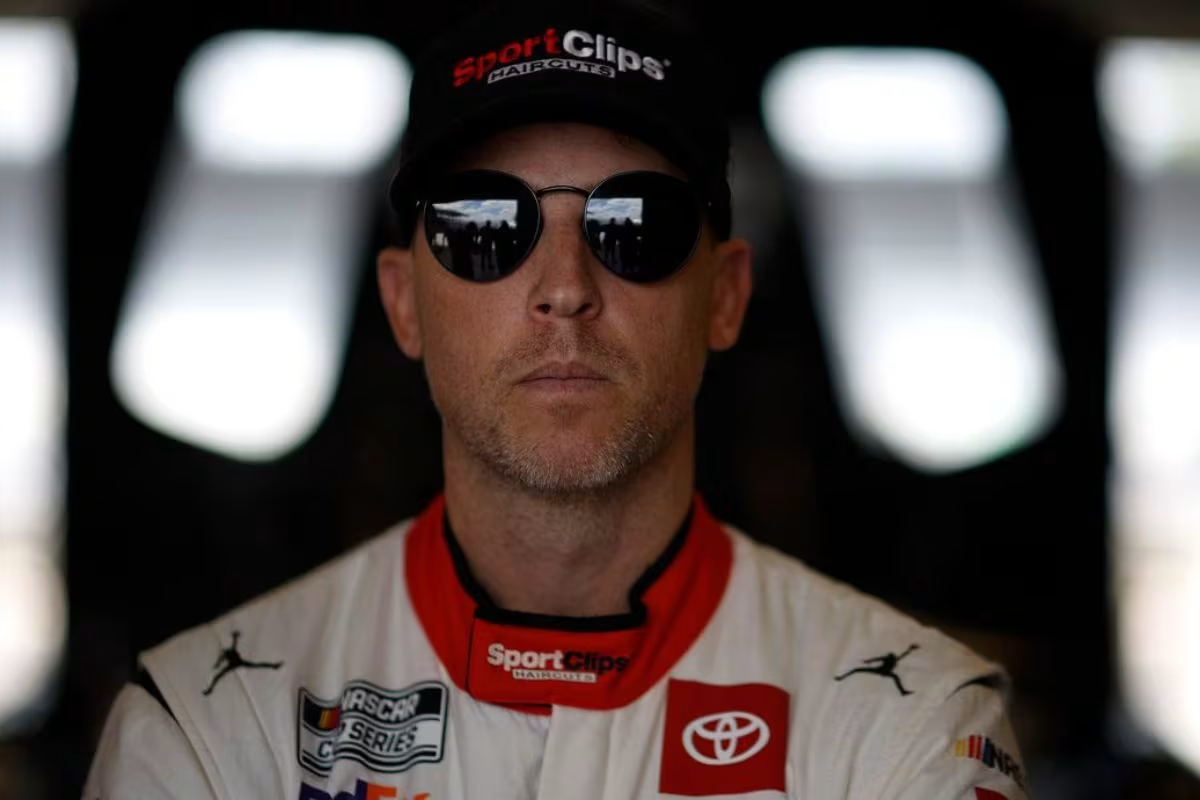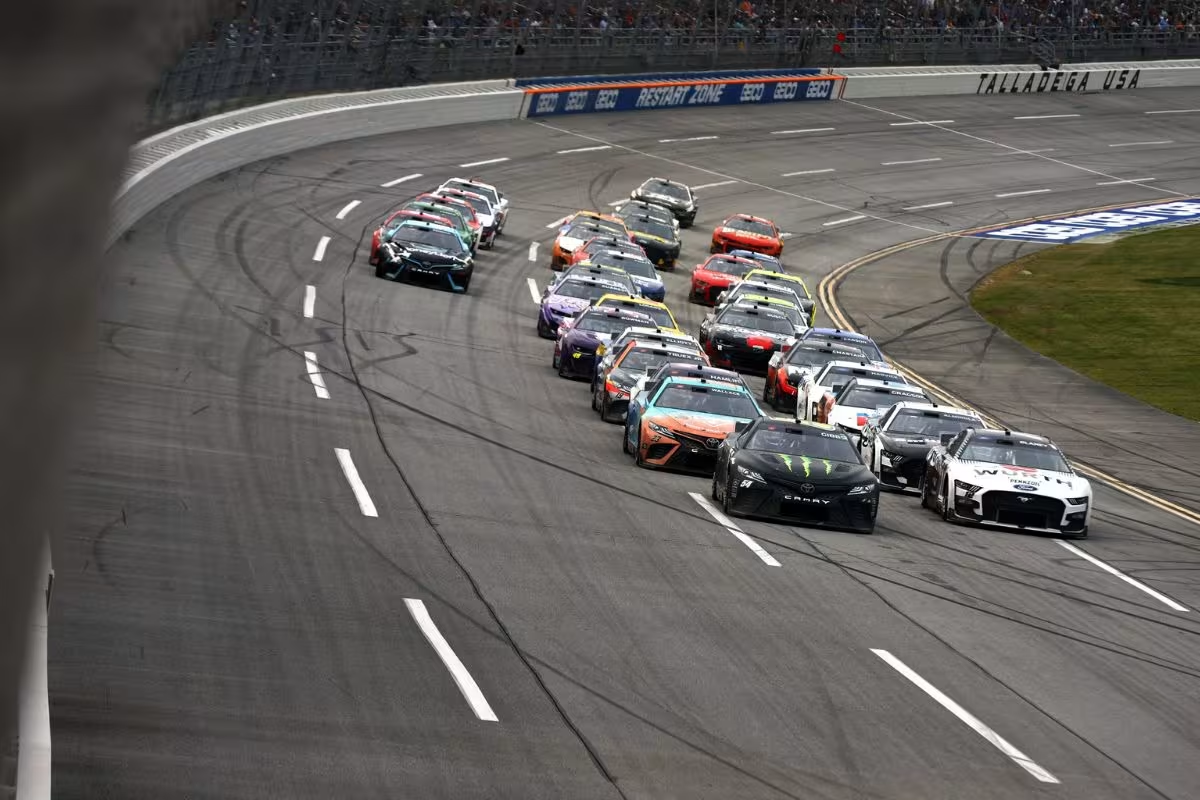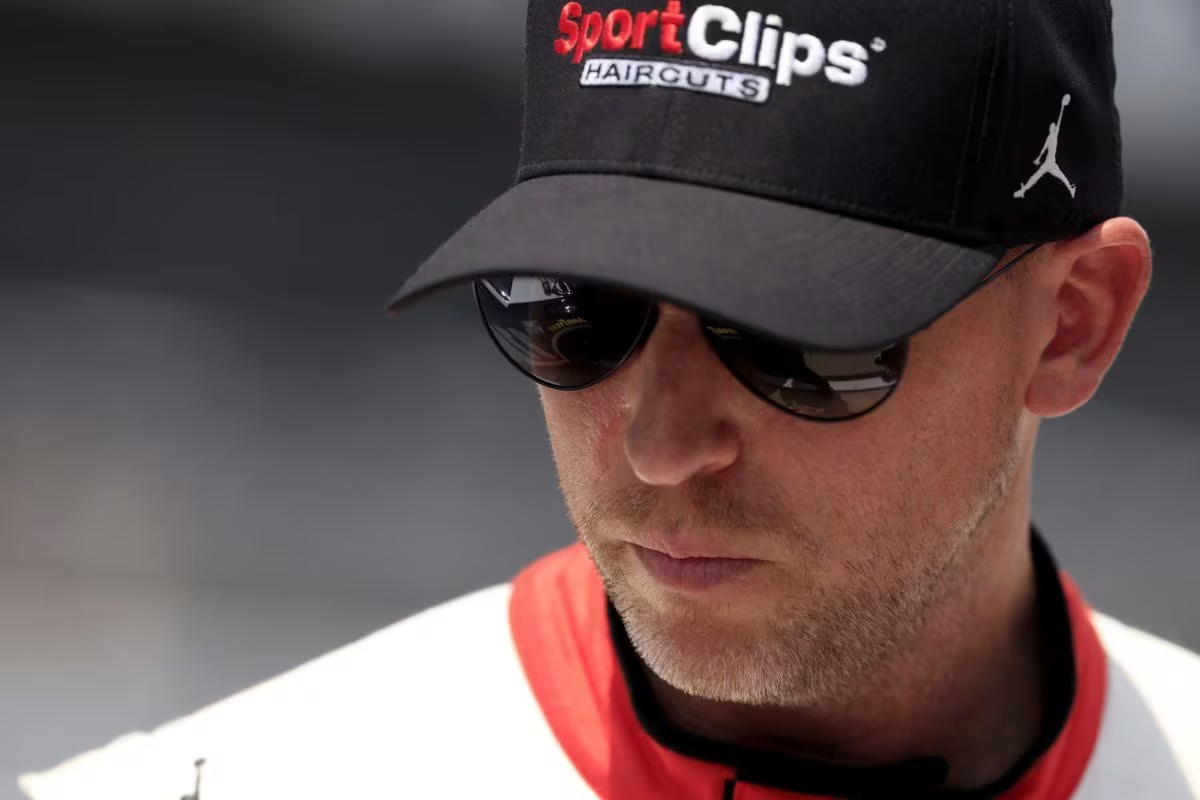Denny Hamlin rips NASCAR’s playoff shift, and he isn’t holding back when it comes to NASCAR’s new playoff schedule. He says the shift to more superspeedways and road courses is a betrayal of the sport’s core traditions. Denny Hamlin, a driver known for mastering oval tracks, argues that these changes have shifted the balance from skill to luck. Could this be the beginning of a bigger debate about NASCAR’s future?
Key Highlights
- Denny Hamlin criticizes NASCAR’s playoff schedule for prioritizing superspeedways and road courses over traditional oval tracks, undermining driver skill and strategy.
- He expresses concern that the changes compromise NASCAR’s integrity and identity, straying from its roots in traditional racing.
- Denny Hamlin raises questions about competitive fairness, arguing that luck plays a larger role in superspeedway racing compared to skill-based oval racing.
- He acknowledges the nostalgia for oval tracks among long-time fans, fearing they may feel alienated by the new playoff structure.
- Despite his critique, Denny Hamlin remains optimistic about a potential return to traditional tracks, hoping for a balance between innovation and preserving NASCAR’s core identity.
Hamlin’s Critique of the Current Playoff Schedule
Denny Hamlin’s critique of the current NASCAR Cup Series playoff schedule reveals a deep-seated concern for the integrity and identity of the sport. By articulating his dissatisfaction through the ‘Actions Detrimental’ podcast, Denny Hamlin highlights critical shifts in the playoff structure that he perceives as a departure from NASCAR’s traditional roots. His contention centers on the inclusion of two superspeedways and two road courses among the initial six playoff races, which he argues undermines the core of what has historically defined NASCAR.
Denny Hamlin emphasizes that NASCAR has thrived on the unique challenge of oval tracks, where a combination of driver skill, strategy, and car performance truly shines. This diversity has been essential to the sport’s identity, fostering a competitive environment where mastery of these tracks is key to success. The introduction of non-oval tracks, particularly in high-stakes playoff scenarios, raises questions about competitive fairness and the preservation of a distinctly American motorsport ethos.
Denny Hamlin’s perspective calls into question the motivations behind such changes, suggesting that they may cater more to entertainment and viewership metrics than to the sport’s foundational identity. Moreover, this critique reflects broader concerns within the NASCAR community about maintaining a balance between innovation and tradition.
NASCAR’s Evolution and Denny Hamlin’s Perspective
NASCAR’s evolution has sparked exciting changes in its competitive landscape, offering new challenges and opportunities for veteran drivers like Denny Hamlin. With over two decades of experience, Denny Hamlin reflects on how these developments have shaped the sport, embracing both its rich traditions and evolving dynamics. With over two decades of experience and 54 victories in the NASCAR Cup Series, Denny Hamlin embodies the shift from traditional racing norms to a more diversified schedule that includes road courses.
Historically, NASCAR’s identity was tightly woven with oval track racing, a format that shaped the careers of many drivers, including Hamlin himself.
Hamlin’s critique of the current playoff schedule highlights a profound sense of nostalgia and a perceived betrayal of the sport’s roots. He articulates a sense of loss, stating, “When it comes to my gripe with the schedule and things like that, it’s because, you know, my whole life I tried to be a Cup Series champion.”
“I wanted to get to NASCAR first, and then, you know, back when I was training for this, or moving up the ranks, all I ever did was oval-track racing, because that’s what NASCAR racing was.”
“We raced on ovals, and they were just all different sizes.” – Denny Hamlin
This sentiment reflects the dissonance experienced by athletes who have dedicated their careers to mastering a specific racing discipline, only to find the landscape shifting dramatically.
As NASCAR integrates road courses into its playoff framework, the sport is embracing a broader appeal, catering to a new generation of fans and drivers.
However, this evolution raises questions about the balance between innovation and tradition. For Hamlin, whose training was steeped in oval racing, the change may feel disorienting.
Superspeedway and Road Course Concerns
The increasing prominence of road courses and superspeedways in NASCAR’s playoff schedule has sparked considerable debate among drivers and fans alike. Historically, road courses like Watkins Glen and Sonoma served as anomalies within a primarily oval-centered framework. Denny Hamlin’s reflections underscore a growing concern regarding the shifting competitive landscape. As he notes, these tracks were once viewed as peripheral, almost exhibition-like events.
“Back in the day, there was a road course, and when I started, there were two, you had Watkins Glen and Sonoma, and that was it. It was just such a small part of the schedule, it was like just a — not an exhibition, but it was like, ‘Hey, this is not what we do, but we’re going to do it this week.'”
“You had real small ones, real big ones, and you know, back in the day, there was a road course, and when I started, there were two, you had Watkins Glen and Sonoma, and that was it.” – Denny Hamlin
The transformation of Atlanta Motor Speedway into a superspeedway has enhanced the playoff structure, introducing an exciting element of unpredictability. This shift increases the thrill of competition, ensuring that every race remains intense and full of potential surprises. It adds an extra layer of challenge for drivers, showing their adaptability and skill in navigating the evolving dynamics of NASCAR. This has led to a mixture of skill and luck that some drivers feel undermines their expertise. Denny Hamlin articulated this sentiment, expressing frustration with a schedule that does not align with his strengths.
“Now, you know, we took Atlanta and turned it into a superspeedway. We’ve changed the game, and we’ve changed — you can argue that superspeedway racing, it definitely still has elements of skill to it. It’s got a big element of luck in it.” – Denny Hamlin
Key concerns regarding the shift towards road courses and superspeedways include:
- Skill vs. Luck: Superspeedway racing often prioritizes luck over driver skill, complicating the competitive balance.
- Tradition vs. Innovation: The increasing frequency of road courses disrupts the traditional oval racing identity of NASCAR.
- Driver Adaptability: Not all drivers possess the necessary skills to excel on both road courses and superspeedways, raising questions about fairness.
- Fan Engagement: The unpredictability of these formats may alienate long-time fans who prefer the consistency of traditional ovals.
Denny Hamlin’s Optimism for Traditional Tracks
With the playoff schedule‘s increased reliance on road courses and superspeedways stirring discontent, Hamlin’s perspective shifts toward a more favorable outlook as the series returns to traditional tracks. At 43, the veteran driver acknowledges that his experience does not fully align with the demands of modern racing, particularly on road course
“I’m not great on road courses, I need to get better at them, I’m trying, but I’m also 43 years old. There’s a point where there’s diminishing returns on the time and effort that I spend to try and get better at road courses.” – Denny Hamlin
Yet, this acknowledgment does not dampen his enthusiasm for the upcoming races at venues like Las Vegas, Homestead, Martinsville, and Phoenix—tracks that resonate with his extensive background in NASCAR.
Denny Hamlin’s optimism is rooted in the familiarity and skillset he has cultivated over his career. Traditional tracks present an opportunity for him to capitalize on his strengths, offering a return to the core of NASCAR racing.
“If it’s going to continue to be such a big part of crowning a champion, then yeah, I’ve got to do what I’ve got to do,” he remarked, expressing relief at the shift back to conventional circuits. He sees this as a pivotal moment, having navigated the earlier playoff rounds characterized by unpredictability and a series of challenges.
“Which is what I wanted to be, is the best guy who knew how to make circles faster than everybody else.”
“So, it’s just — we made it through the first six races, with all these wild cards, with the 14-points penalty for that engine. We made it, and now the sky is the limit.” – Denny Hamlin
This renewed focus on traditional venues allows Hamlin to channel his expertise into competitive performance. His words reflect a deep-seated desire to excel in the sport he loves, emphasizing that success on these tracks aligns with his identity as a racer.
News in Brief: Denny Hamlin Rips NASCAR’s Playoff Shift
Denny Hamlin’s critique of NASCAR’s playoff schedule highlights a notable tension between tradition and evolving racing formats. Concerns regarding the inclusion of superspeedways and road courses reflect a broader debate about the preservation of the sport’s heritage.
Despite these challenges, optimism remains for a potential shift back to traditional tracks, suggesting that a balance between innovation and tradition may ultimately improve the integrity and appeal of NASCAR racing.
ALSO READ: NASCAR’s Pre-Race Drivers’ Meetings Are Useless? Denny Hamlin Questions Their Value




